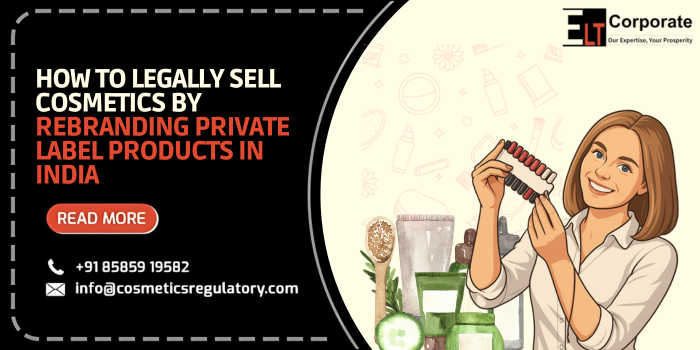India’s beauty and personal care industry is one of the fastest-growing markets in the world. Many entrepreneurs are turning to private label cosmetics in India as a cost-effective way to launch new brands. However, just rebranding products with your logo does not make it legal to sell them.
To follow the cosmetics Rules 2020, you have to obtain the right license – such as a loan license for cosmetics, a cosmetic manufacturing license, or CDSCO cosmetic registration – and also follow BIS standards and legal metros cosmetic packaging rules.
This guide gives a step-by-step guide on how to sell cosmetics legally in India through private or white-labeled manufacturing.
What are Private Label Cosmetics?
Private label cosmetics are products manufactured by a third-party feature, but are sold under your own brand name. For example, a licensed manufacturer can produce lipstick or face cream, and you rebrand them with your label and packaging.
This model saves R&D, time and investment in production. But if you sell private label skincare, makeup, or haircare, your brand should still follow CDSCO cosmetic license requirements.
Why Legal Compliance Matters
- Protects your brand from CDSCO penalty, product recall or ban.
- Safe, BIS-ensuring creates consumer confidence.
- E-commerce prevents delay in onboarding (Amazon, Flipkart, and NYKAA require compliance).
- Allows entry into retail chains and exports with recognised licences.
Cosmetic Licences in India: Manufacturing, Loan & Import Registration
1. Loan Licence for Cosmetics (Form COS-6 → COS-9)
- If you use a third-party manufacturer to rebrand cosmetics, you need a loan licence for cosmetics issued by the State Licensing Authority.
- This authorises you to legally sell under your brand using another’s facility.
- Documents include: manufacturing agreement, technical staff details, GMP compliance, and plant layout.
2. Cosmetic Manufacturing Licence (Form COS-5 → COS-8)
- If you set up your own facility, you must apply for a cosmetic manufacturing licence in India.
- Requires site inspection, qualified staff, and adherence to Seventh Schedule GMP norms.
3. Import Registration Certificate (Form COS-1 → COS-2)
- If sourcing private label cosmetics from abroad, you need CDSCO cosmetic registration before selling.
- Apply via the SUGAM portal with Power of Attorney, Free Sale Certificate, ingredient list, and proposed labels.
- Once approved, CDSCO issues the COS-2 Import Registration Certificate.
Cosmetic Labelling & Packaging Compliance in India
Labels are a critical part of compliance. Both Cosmetics Rules 2020 and Legal Metrology (Packaged Commodities) Rules, 2011 apply.
Mandatory declarations include:
- Product name & cosmetic category
- Manufacturer/importer details with full address
- Batch/lot number
- MRP & net quantity
- Manufacturing date & use-before date
- Country of origin (for imports)
- Consumer care details (email/phone)
Wrong or missing labelling is one of the most common reasons for cosmetic license rejections in India.
Ingredient & Safety Compliance
- Follow BIS standards for approved ingredients, colours and cosmetics (4707 parts 1 and 2).
- Follow the ninth schedule of cosmetics for product standards.
- Ensure that your products are not tested on animals, as India bans the manufacture and import of animal-derived cosmetics.
Packaging & EPR Compliance
If your products use plastic packaging, it is mandatory to comply with the Plastic Waste Management Rules 2016.
- Brand owners must register under the CPCB EPR portal for expanded manufacturer responsibility.
- Non-transportation can result in punishment and product restrictions.
Step-by-Step: How to Sell Cosmetics Legally in India by Rebranding
- Choose a Licensed Manufacturer – Verify their COS-8 licence.
- Sign a Manufacturing Agreement – Define roles, quality, and formulations.
- Apply for Loan Licence – Submit Form COS-6, get COS-9 from State Drug Controller.
- Design Labels According to Rules – Follow CDSCO + LMPC labelling requirements.
- Check Ingredient Safety – Comply with BIS IS 4707 & Ninth Schedule.
- Submit Non-Animal Testing Declaration – Required for all cosmetics.
- Register for EPR on the CPCB portal if using plastic packaging.
- Start Marketing & Selling – Only after approvals are granted.
Common Mistakes to Avoid
- Selling without a loan licence or import registration.
- Skipping legal metrology cosmetic packaging declarations.
- Using misleading claims such as “100% cure” or “chemical-free.”
- Forgetting to pay 5-year retention fees (licences are perpetual but require retention).
- Using restricted ingredients or non-compliant colours.
FAQs
Can I rebrand imported cosmetics and sell them in India legally?
Only with a CDSCO Import Registration Certificate (COS-2).
Do I need a loan licence for cosmetics in India if I use private label manufacturing?
Yes, Form COS-6 must be filed; the licence is issued in COS-9.
What standards apply to cosmetic ingredients in India?
BIS IS 4707 and Ninth Schedule under Cosmetics Rules 2020.
How long does it take to get a cosmetic loan licence in India?
Usually 30–45 days, depending on inspections and document readiness.
Conclusion
Private label cosmetics rebranding is a powerful way to enter India’s fast-growing beauty market. But you have to follow the right path: obtaining the right cosmetic license in India, ensuring labelling compliance and following BIS standards.



